I recently saw a video by the Board Game Garden and thought man, that’s the most solid recommendation list for solo board games I’ve seen in a long while. I like to play solo from time to time so I read a lot of those lists and are usually pretty disappointed. Most contain a lot of a) historical war games, b) ameritrash games, or c) card battlers, all of which are not really my taste. There are also a surprising amount of games that people really love for solo playing where I find the solo mode really unappealing.
For me, a good solo mode should:
- Feel like the multiplayer experience: a surprising number of games have a solo mode that plays way different than the normal game and/or leave out core element of the gaming experience.
- My opponent should feel like a human: it should ideally have some form of strategy I can counteract.
- Give me a reason to play it 10+ times: some solo modes are fun during the discovery phase but lose their appeal once the puzzle is cracked.
- Administrating an automa shouldn’t break the flow of the game: I primarily want to play a game, not spent my mental effort simulating someone else
So here is my list of recommendations as of 2023 if you are more in towards the euro-omnigamer spectrum and want to enjoy playing something solo more than just a couple of times.
Let’s Just Play a Quick Round (< 30 min)
This category is for when I quickly want to play something without having to think too much. These games are ideal after a long day to make a cup of tea and just relax:
Tranquility is as relaxing as its name suggests. If you liked Solitaire on your Windows PC, this should tickle a similar nerve. The goal is to fill a 6×6 grid with cards in ascending order out of a deck of numbers 1-80. The clue here is that your deck is also the games timer and whenever you play a card to an already existing card, you have to pay the difference as penalty. The base game alone isn’t as exciting solo, but if you throw in 1-2 expansions AND remove a couple of cards to introduce uncertainty, it becomes a joy to play solo. My recommendation: remove 6-8 cards, add the cliff (locks of a complete row) and the sea monsters (you have to destroy something you already build).
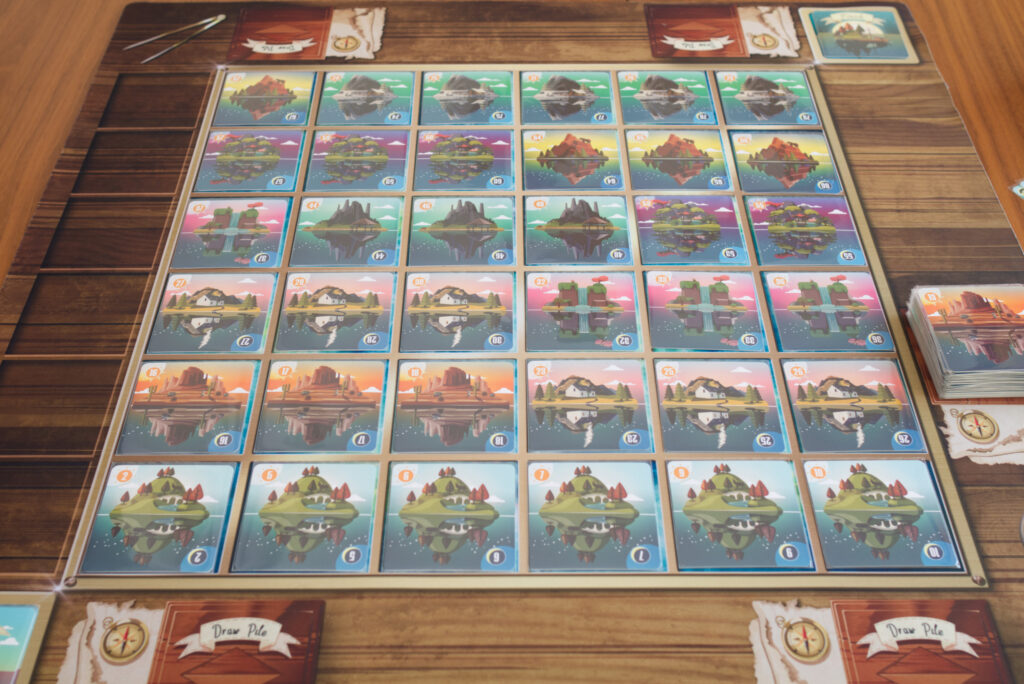
Burgle Bros (1 or 2) are a nice combination of push your luck and deduction game. A crew of robbers is trying to loot 2 or 3 levels of 4×4 grids of tiles representing either a company in case of the first game or a casino in case of the second. Every turn you have four actions and then the guards move. If you draw too much attention and a guard catches you, you get stress and ultimately loose the game. Both games introduce obstacles like the loot you get is a price cat that keeps jumping out of your arms every couple of rounds and you have to catch it again. Burgle Bros 1 is a bit more analytical, 2 is a bit more flavourful and chaotic. Both great fun if not taken too serious.
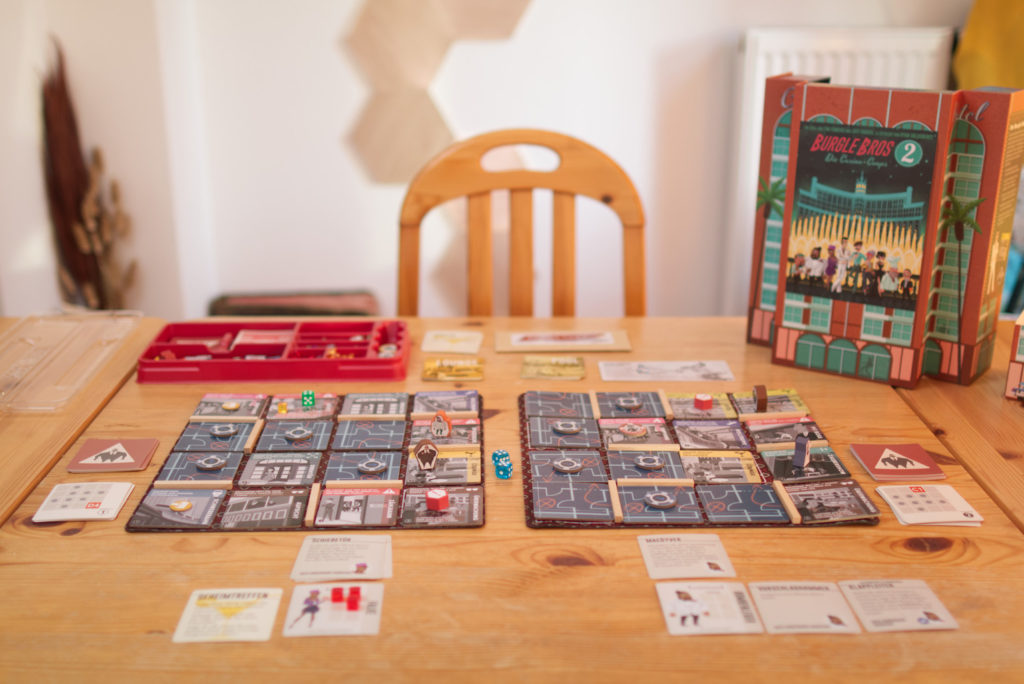
On Tour is the only roll and write that has survived the test of time for me so far. Every round, you are filling up the map (Europe or USA) with two numbers generated by the included dice. You are limited where to place them by the three cards drawn each round but ultimately try to produce a long route of consecutively increasing numbers. It creates a great false sense of being easy in the beginning and usually end in outer despair in the end. Also the theme of creating a tour for your brand and the artwork is pretty lovely.
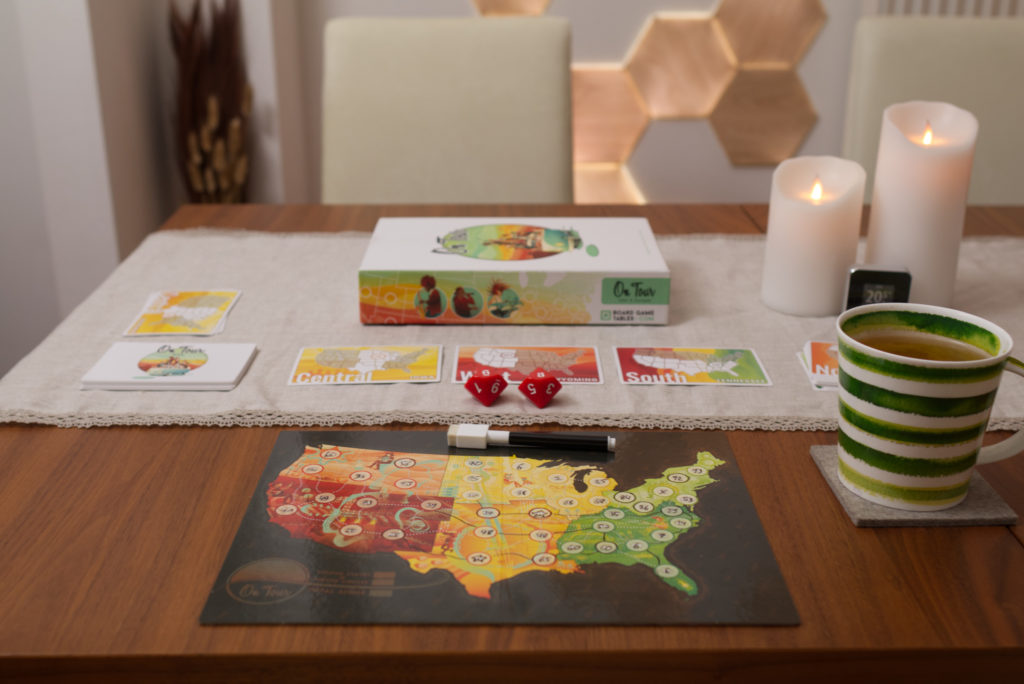
The Game is one of those games I always forget about but that is actually quite surprisingly good. The goal is to get place all cards in a deck on four piles: two only allow placing numbers higher than their current value, two only lower ones. Every turn, one is forced to play 2 cards regardless of how bad it is, so you are effectively digging your own grave. There is also the possibility to be clever: if you have a number that is exactly 10 off the current value, you can place it on a pile to pull it in the opposite direction again which allows for great combos if you can pull it off. Simple, cheap, small box, hard to go wrong with “the Game” if you like patience-style games.
Tiwanaku can be described as competitive minesweeper meets sudoku. It’s a rather recent addition to my collection but so far I enjoyed it way more than I thought I would. In some parts it reminds me of Ricochet Robots or Set: with a little bit of practice, you quickly leave new players no chance to win. The most interesting part is that the positional play is probably the most important aspect: hanging on to spaces that you are uncertain off but that have a high probability of turning out to bring big points. It also often gets to situations where you a) need to discover a field of a certain colour but b) also want to block your opponents from moving somewhere.
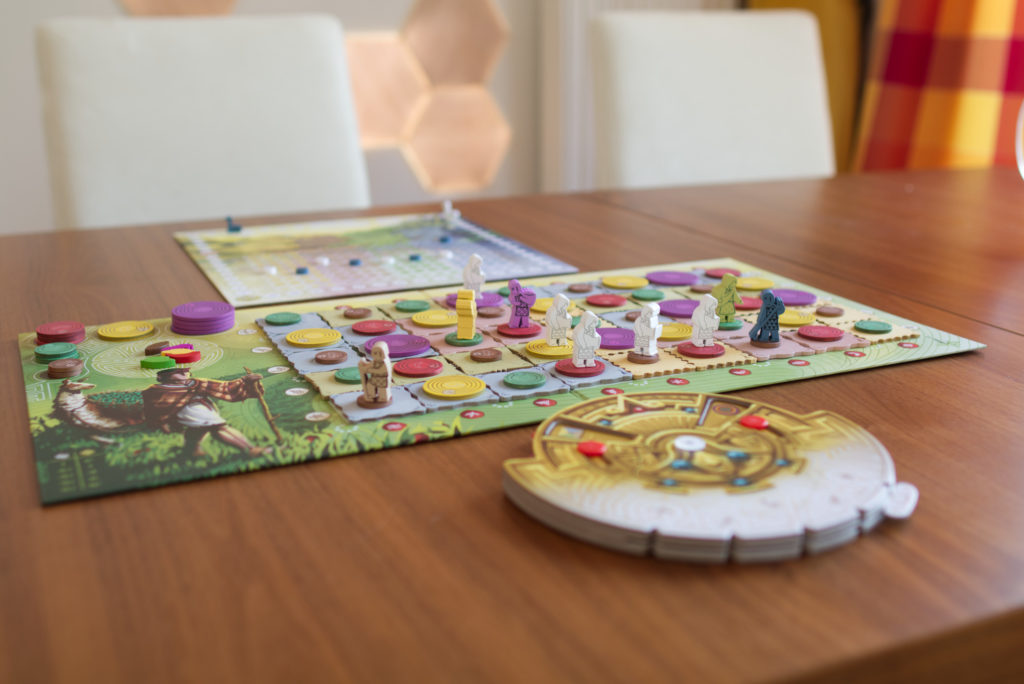
Give Me Something Substantial (45-90 min)
For me, this is typically the most pleasurable category of solo experience, something I can bring out in the evening instead of watching a movie or reading a book: substantial, thinky, but highly enjoyable and can be completed in one sitting.
Carnegie is my favourite game out of 2022 and it has one of the most interesting automa I discovered in recent times. In Carnegie, you have to manager your workers inside your company, build new departments to get additional functions, but also research new projects and build them on the map. The clever bit is that the active player has it in their hand to choose what type of action is done by all players that round. Also income generation is connected to both that decision as well as where you placed your worker meeples in previous rounds. It’s a great game and even more surprisingly translate perfectly to solo play. For one, the automa deck uses the cards backs to give the human player indications of what the automa might do the next round or profit the most off. For the other, the automa scores based on what you build. So it can happen that you run a certain strategy and mid-game the automa claims a VP multiplier for exactly that strategy and you have to pivot on the spot. Great game, strong recommendation of you like euro-style games.
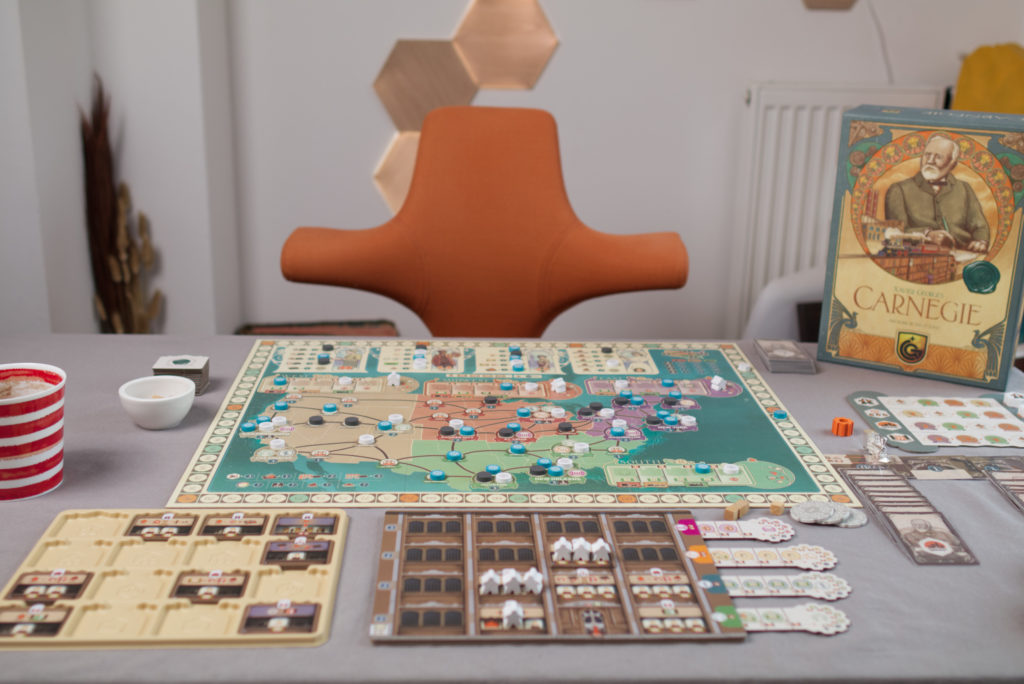
Concordia Solitaria turns the classic board game Concordia into a great solo puzzle. Base Concordia distinguishes itself by its clean design and surprisingly short rules. Players are producing and selling goods in the Mediterranean, which isn’t the most unique of themes. However, its action mechanism is quite clever: players have a personal deck of action cards from which they can choose any they want. However, at some point it becomes a balancing act whether you want to continue playing available actions or need to basically skip a turn to get all previously played actions back to your hand. It’s tight, it’s fast, it’s really clever. Instead of using an independent automa deck, Solitaria replaces the human player’s deck with a slightly modified version that also includes the automa’s action. So when you do one action, you know exactly what the reaction of the automa will be (plus a lite bit of randomness due to dice rolls). This turns Concordia into this great puzzle where you feel it’s your fault if you lose because you didn’t correctly anticipate the consequences of your actions.
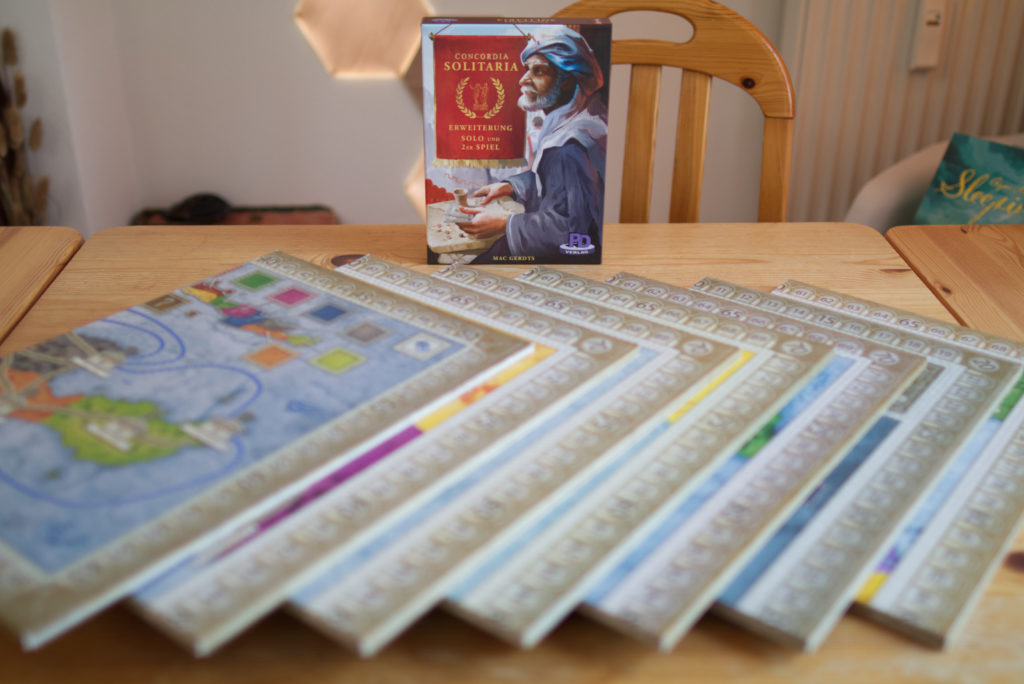
Dune Imperium is another of my favourite games of recent years. What makes Dune special is that a) combines worker placement and deck management but also b) is really, really tight. To win the game, one only needs 10 VP, so every single action, very single battle is important. Despite the automa being a simple get-in-your-way type of automa deck that would have been boring in a lot of other games, it really hurts you if it gets in your way because the game is this tight.
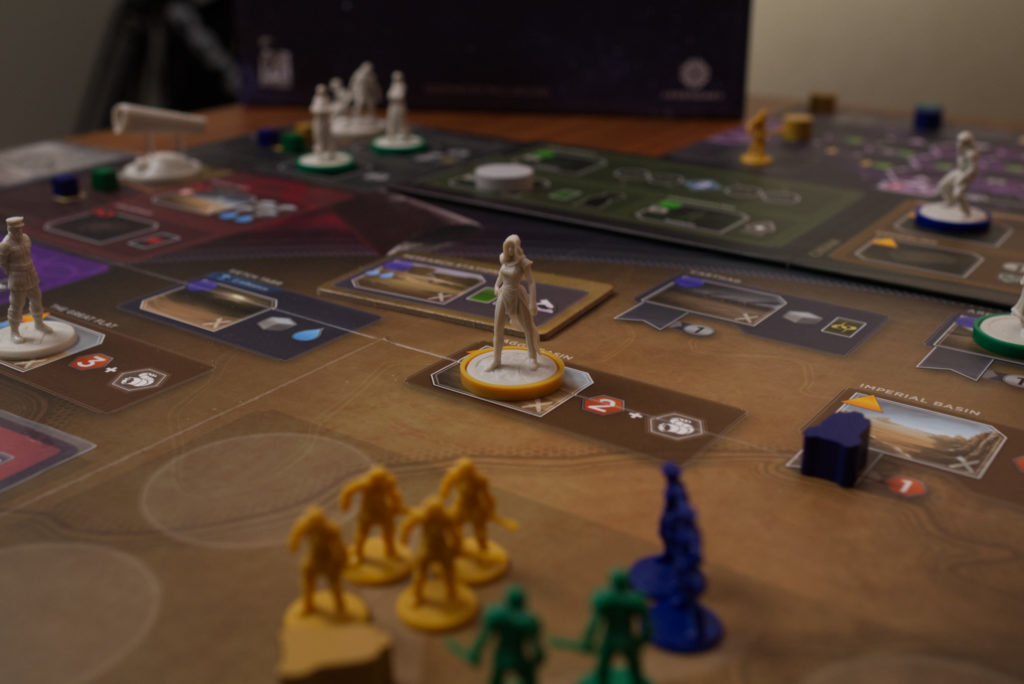
Paperback Adventures is a kind of scrabble/wordle meets card battler. You are facing off against 6 increasingly difficult bosses each with their own slightly different special powers. Each of the fights starts with you shuffling your rather limited deck (10-12) of letter cards and drawing for cards. Using some additional special cards, you then assemble a word and depending on how you do it, trigger certain special effects, collect attack or defence symbols, as well as charge up power you may use in later turns to trigger a growing collection of helpful items. It’s a really clever game and good fun to play, but there are two downsides: 1) playing all 6 fights takes a substantial amount of time, maybe more than you might want to spent on a word game. 2) it’s rather pricey with 60-100€ depending on how many different character sets you buy. I’d recommend getting the core box and the “Damsel” character box. This character focusses on short words and is a nice substitute for my Wordle addiction.
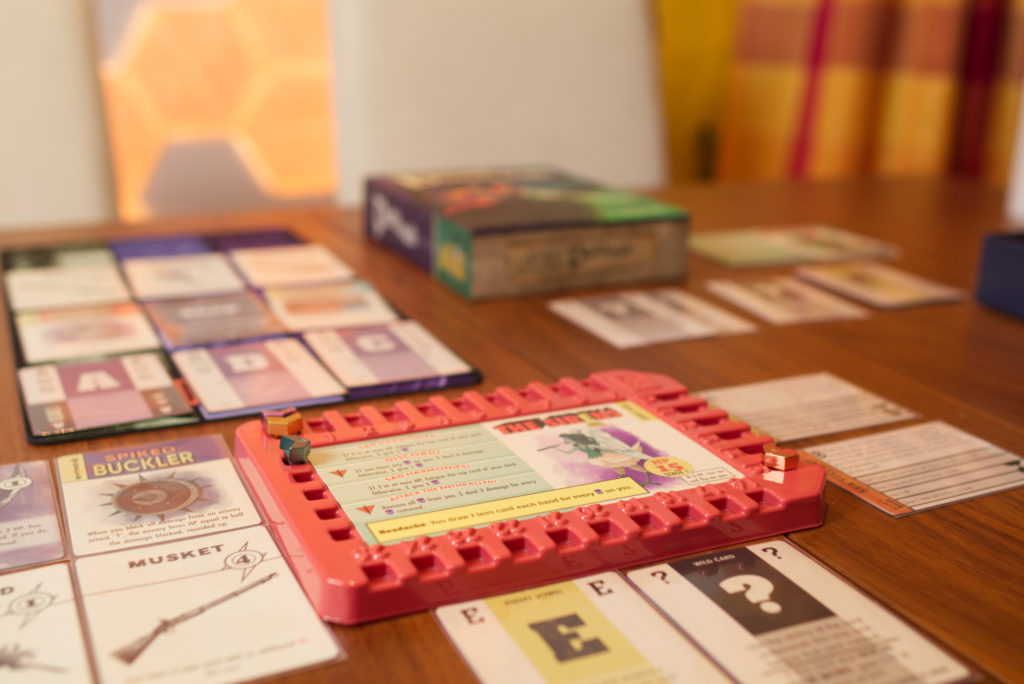
Heat – Pedal to the Metal is the race game for people that usually don’t like race games. Depending on the gear you car is in, you are forced to play a certain number of cards from your hand that indicate how many squares you move that turn. Things get interesting due to the element of “Heat”, sort of the stress your car can handle without breaking apart. Whenever you race too fast through a corner, shift up or down too aggressively, you have to put head into your discard pile. When the discard gets reshuffled into your deck and you start collecting heat on your hand, it clocks up your “engine” because heat cards cannot be played! The only way to get rid off them is to slow down and let your car cool down, something that is tricky to do when the competition is constantly breathing down your neck. Great game and the automa system is really quick to administer, even if you want to play against the full set of 5 automa.
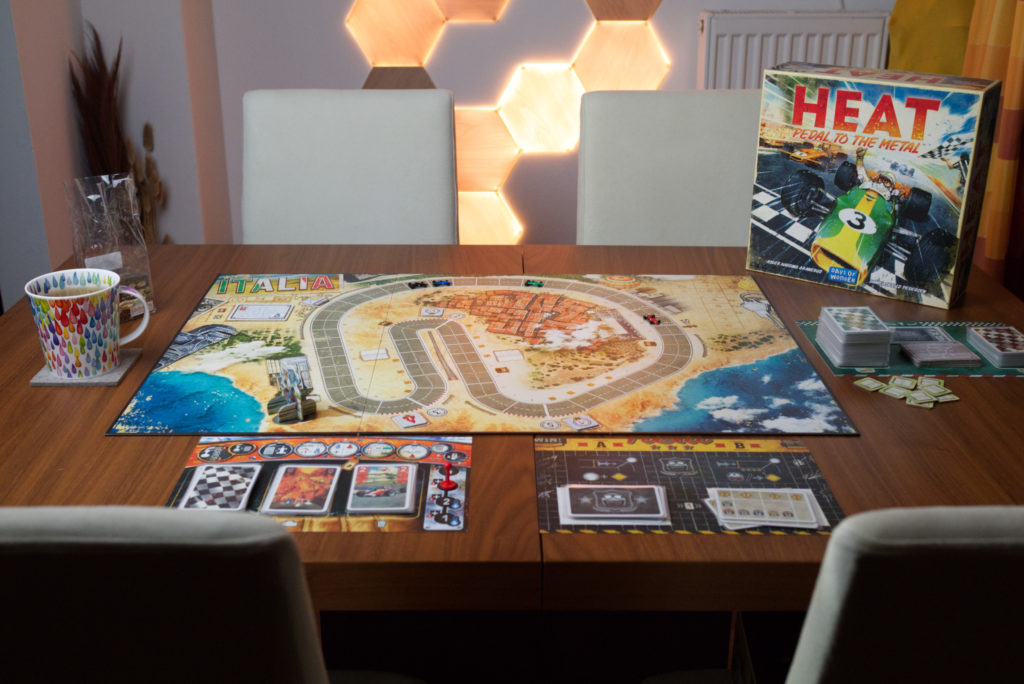
Grand Austria Hotel is another game that a) is a favourite of mine and b) keeps me wondering why I don’t get it to the table more often because I love it so much whenever I do. The theme of managing a hotel is lovely, the fact that the whole game only lasts 7 rounds with 2 actions per player makes it super tight. There are two ways to play this solo: the expansion “Let’s Waltz” added an official solo automa deck. The other option is to use the unofficial deck by mautoma. The latter was actually the basis for the official automa.
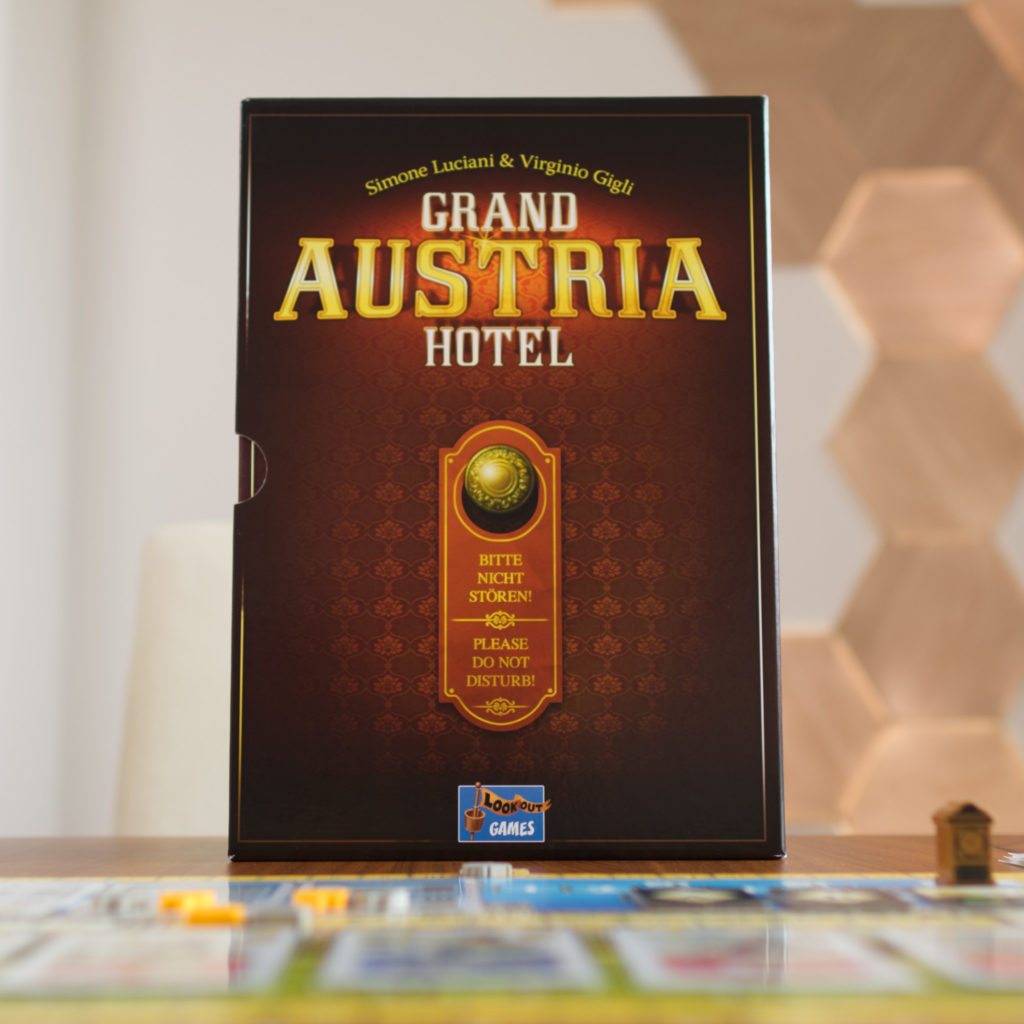
Anno 1800 is a board game adaption of the computer game by the same name. In Anno 1800, you build up a growing collection of industries to satisfy the needs of your population. What is clever about this game is that at no point do you collect resources but instead have to trigger factories on demand or trade with your opponents’ factories. Each turn plays very quick and each thing you do feels rewarding, kind of like playing a mobile game. The base game doesn’t contain a solo mode but a BGG user created a solo story campaign that was then picked up by the publisher Kosmos. It’s really clever and fun and I actually prefer this playing solo to multiplayer now.
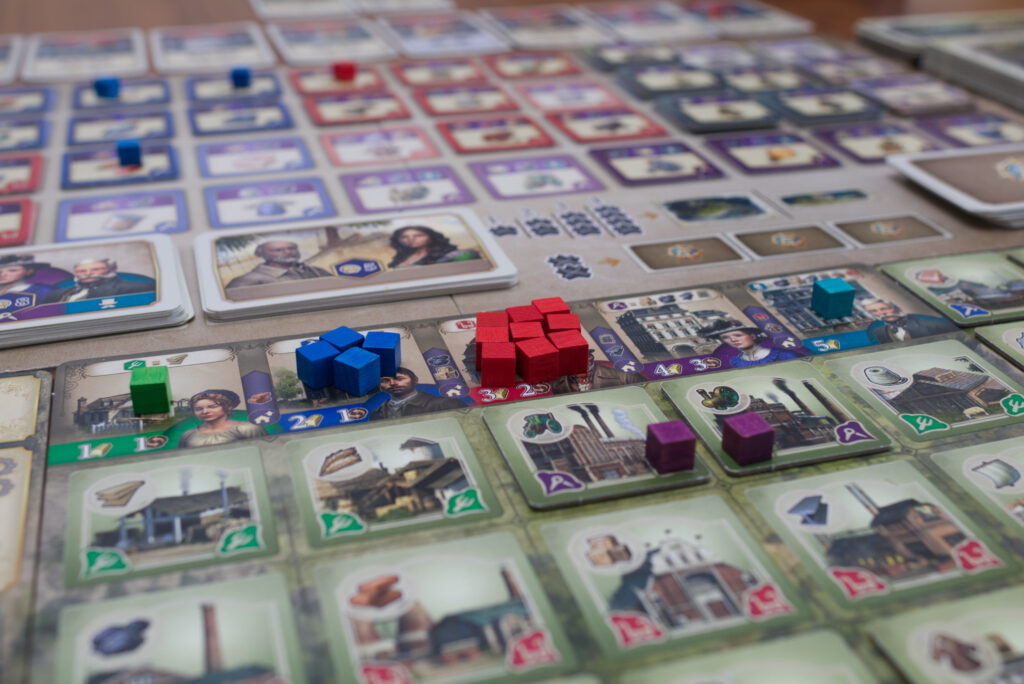
It’s a Rainy Sunday (2h+ min)
This category of games is not stuff I get out on a normal weekday. It’s more for when it’s a rainy weekend or I’m on vacation and want to immerse myself in a single game. While some of them based on their play time could be played on any given day, there might be something else about them such that they are more for special occasions.
John Company 2nd Edition is a beast. Not only takes it 3-4 hours to play, but also contains a 48 page rule book plus additional rules book for the automa. However, it’s an experience that is second to none. In JC2e, players represent powerful families vying for offices in the East India Company as opportunities to enrich themselves. It’s surprising how Cole Wherle managed to take a historical topic that is so dark into a game, that is both insightful when it comes to the actual history but also fun without being disrespectful. Every time I play it feels like being part of a movie or an alternate history where I’m just playing a small part. Whether or not I win doesn’t matter, because it is so rewarding to see how things play out. The astonish bit is that this game works as a solo game at all! John Company is all about negotiating with the other players as no single player can act alone. The solo mode uses a clever system of favours, red wooden cubes that you get from the automa when you do something that benefits them and can trade in when you need something from them.

The Colonists is a game for when you have nothing planned on a day … or rather a whole weekend. Quite true to the label on the box, this game is quite epic. Through four different eras, players try to build up their industries, starting from simple wood production to producing goods with iron. This game is a bit multiplayer-solitaire anyway, so it translates quite well to playing solo. The biggest downside is that it becomes a beat your own score type of game, my least favourite type of solo experience.
Sleeping Gods is my favourite story-telling game so far. Think choose your own adventure book but with a map, combat system, skill checks, and more. The game world is so big that even without the expansion, it takes multiple campaigns to see half of it. The world building is quite lovely, the stories witty and well written. However, there is only a loose over-arching narrative, so it is more a case of explore the world and enjoy than going through a strict story. Playing a single campaign usually takes 3 multi hour sittings, so this is more something you keep set up on a side table and play over multiple days. I’m 6 campaigns in and would be happy to do a new one any time.
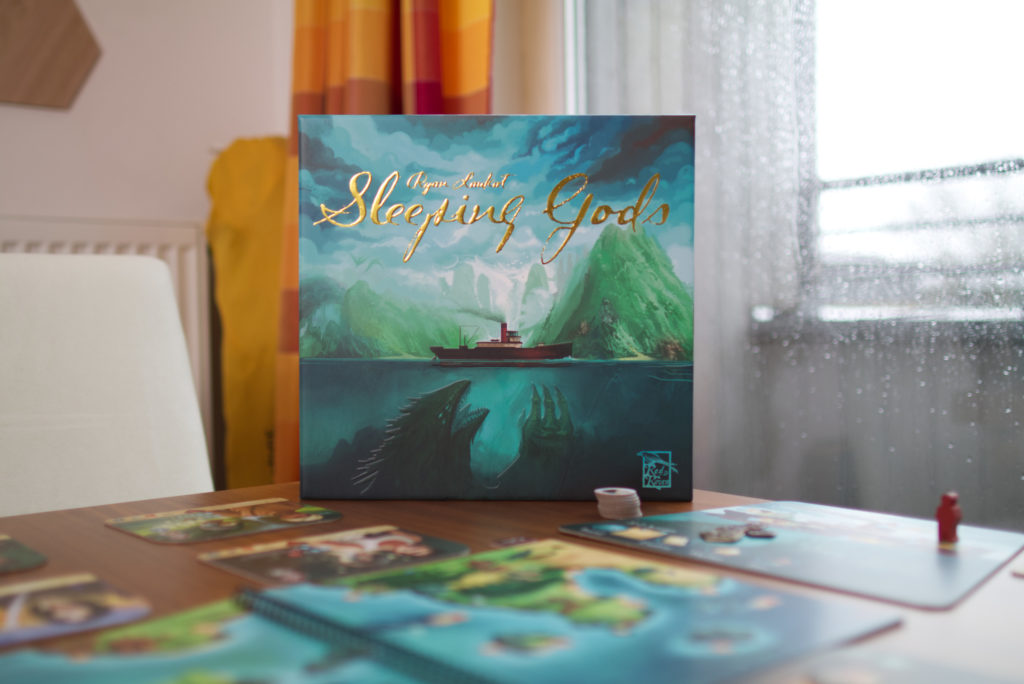
Kanban EV is my favourite game by designer Vital Lacerda. He is know for his complex games featuring tightly interlocking mechanisms and this one is no exceptions. For people not familiar with this style of game, it can be a bit of a challenge to get into it. It took me about 3-4 plays and watching multiple videos to get to a state where I’m comfortable with the rules and can just play. But if you manage to get there, this is a highly enjoyable game. Each round, you go to a different department in a factory such as design or assembly. While the actions themselves are not complex, getting the timing right is like skipping rope: if you go somewhere one turn too early or one turn too late, that has serious consequences. What makes this great as a solo experience is that the two automa you play against actively try to get you fired. Every point they make deducts VP from your score and if one of the game’s meetings happens and you end up with zero points, the game ends prematurely. Lovely theme, great game, great solo mode.
Underwater Cities is one of those games I have to be in the right mood for. Its central mechanism is that you claim an action spot and play a card. If the colour of the spot matches that of the card, you get both the effects of the spot as well as the card. If not, you discard the card without effect. What makes this game interesting is that production only happens every 3 turns or so. While things might look easy in the first round, your resources quickly dwindle and you have to be very efficient in your actions to not lose all your inertia before the next production happens. The theme is also quite lovely. However, it is another case of beat your own score. The game only locks up certain action spots and there is no real opponent to play against.
Honorable Mentions
The following games have great solo modes but I simply don’t play them that often.
Brass Lancashire / Birmingham is another game where Mautoma has created an unofficial solo mode. While I don’t enjoy playing against them enough to bring the game out, they unlocked the Brasses for me when I started learning those games. Initially, I had a hard time getting into those games. But being able to play them solo and learn to read the board and experiment was quite liberating.
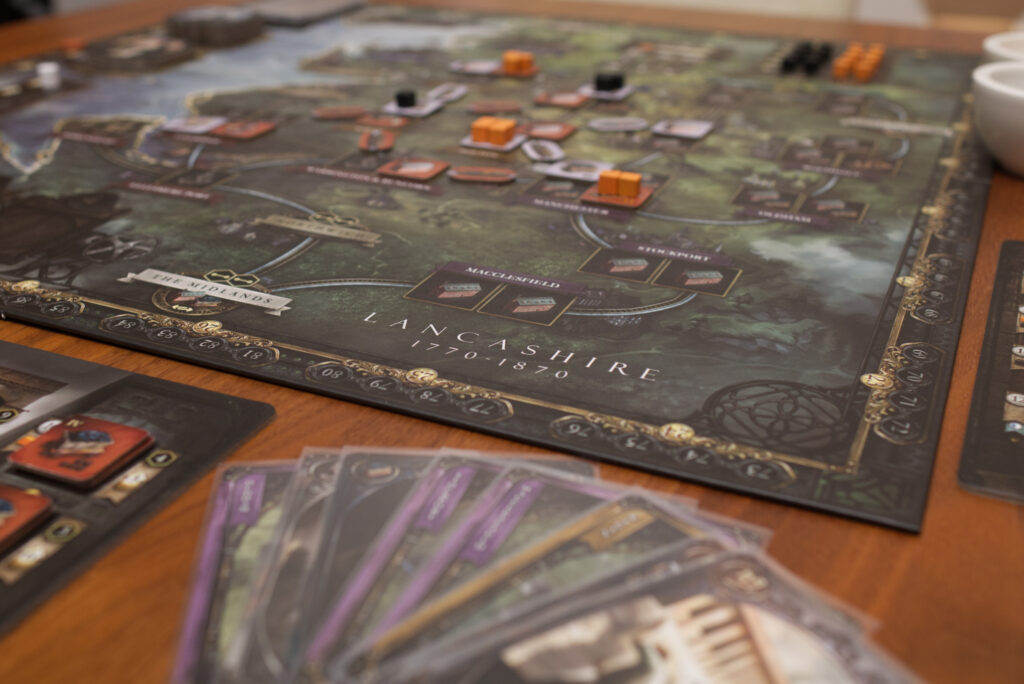
Curious Cargo has two major caveats: it’s a very thinky game that is not to everyone’s liking and the solo mode unfortunately never officially saw the light of day. You can find it on the internet if you join the author’s playtest discord. I really enjoyed playing this solo for a while but once I grocked the puzzle, I rather wanted to find someone to play against than continue playing solo. The solo mode works really well though, definitely recommendation to check this one out if you like puzzles.
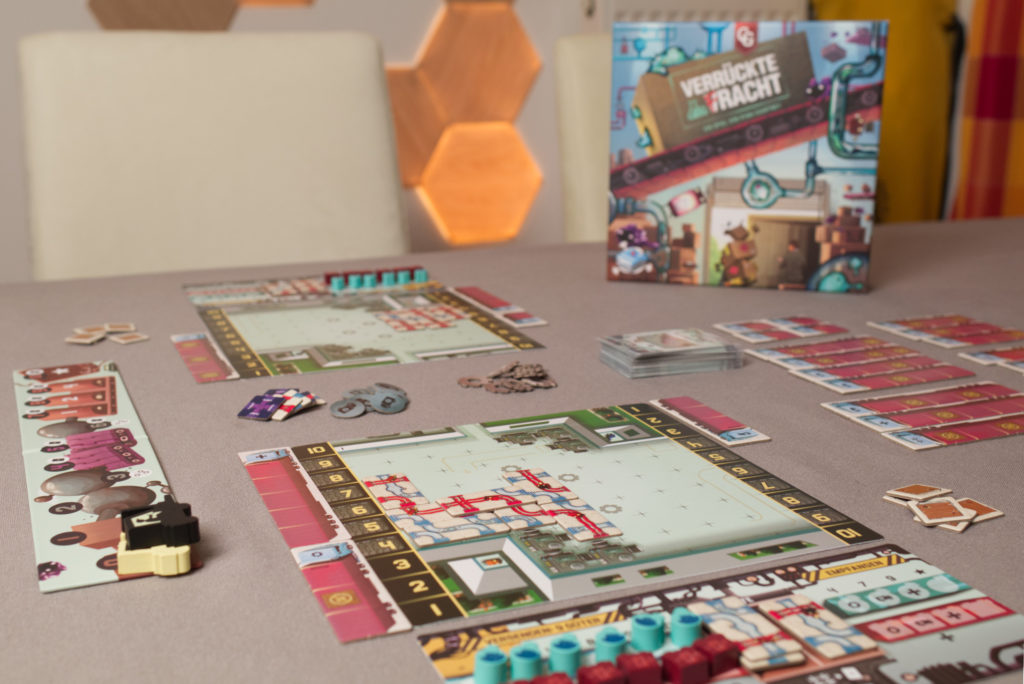
Splendor Duel has no official solo mode, which is a shame because a BGG user created one that works really well. I wish it would have been part of the official release! It’s fun to play and I was obsessed with it for about 2-3 weeks but ultimately it doesn’t hit my table anymore.
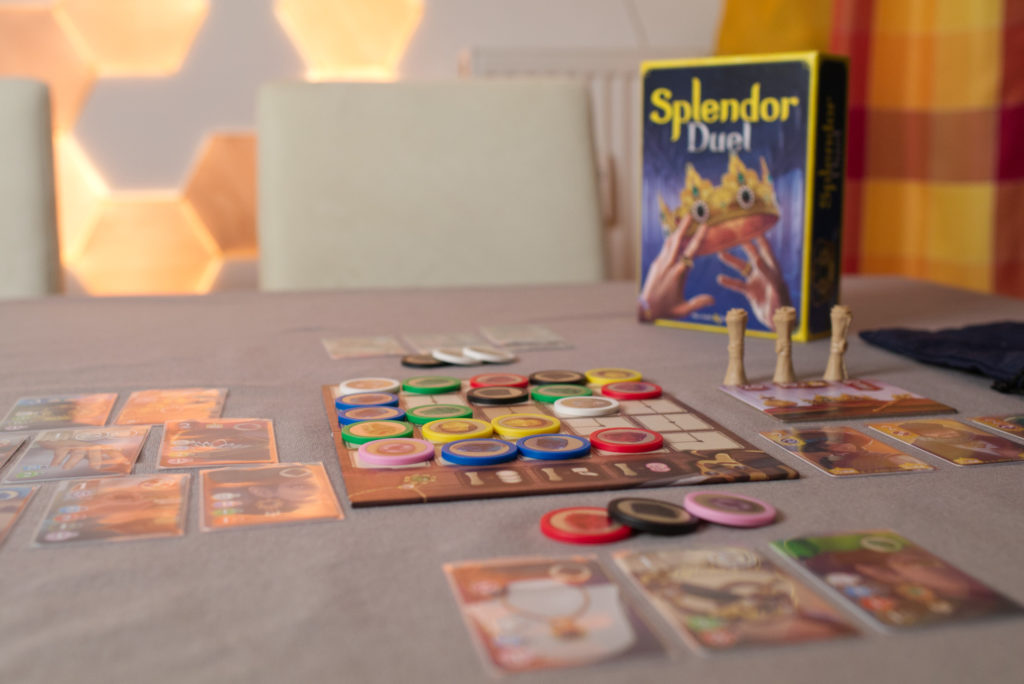
Cellulose wins sympathy points simply by its theme. You’re growing a plant and interact on the cell level. It’s a refreshing setting and the solo mode also uses a “strategy map” to give the automa additional flavour. If you look at the box, you wouldn’t believe this is as solid a game as it is. I really enjoyed this one for a number of weeks but I would need some more scenarios or something else to pull me in again. Unfortunately the released scenario pack seems to not really have hit Europe.
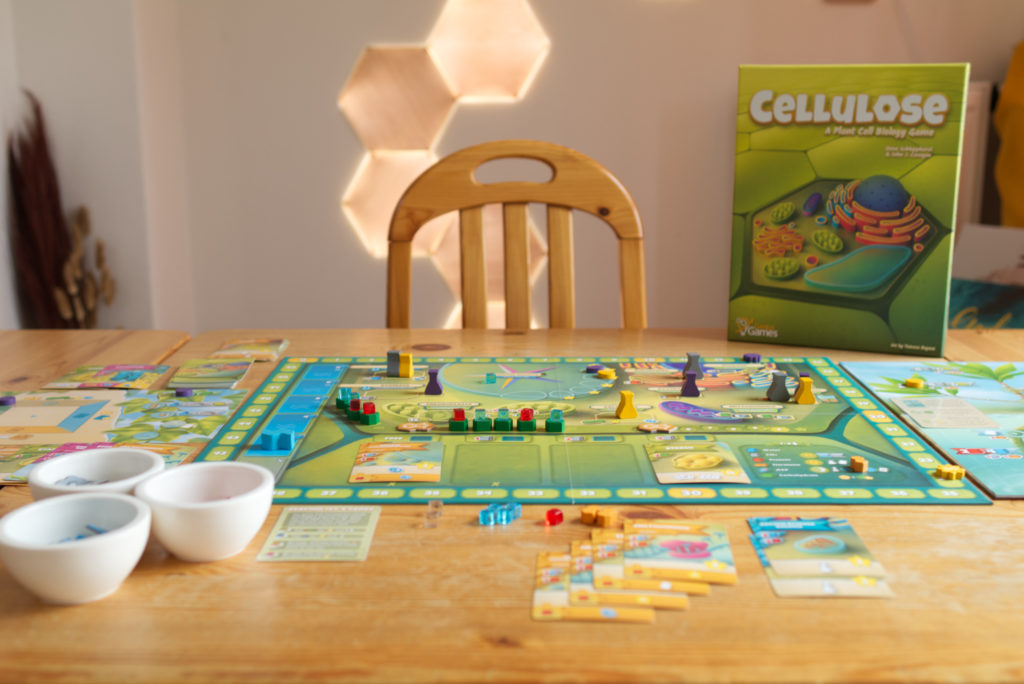
Not Really Working For Me
I thought it might be helpful to also list a couple of games that I tried but that didn’t work for me for various reasons. These reasons might or might not apply for you, so your milage my vary:
- Solo mode is too different from multiplayer experience: Suburbia, Maglev Metro, Red Rising, Castles of Mad King Ludwig
- Good game but solo mode is just a beat-your-own-score: Agricola, Ora et Labora, Messina 1347
- Automa doesn’t feel like a human player / no challenge: Tiletum, Foundations of Rome, Troyes, Wingspan
- Solid but missing a reason to get to the table: Pax Pamir 2nd Edition, Rococo Deluxe, Oros, Golem, Lisboa, Paperback / Hardback
- Good at first but got boring on repeated plays: Maracaibo, Oh my Goods, Expedition to Newdale, Woodcraft
- I unfortunately found the base game itself boring: Coffee Roaster, Nemo’s War, Sprawolopolis (gets better when adding one of the expansions), Shogun no Katana, Obsession, CloudAge, Encyclopedia, The Networks, Stars of Akarios, Under Falling Skies, Vinhos, Welcome to the Moon, Lands of Galzyr
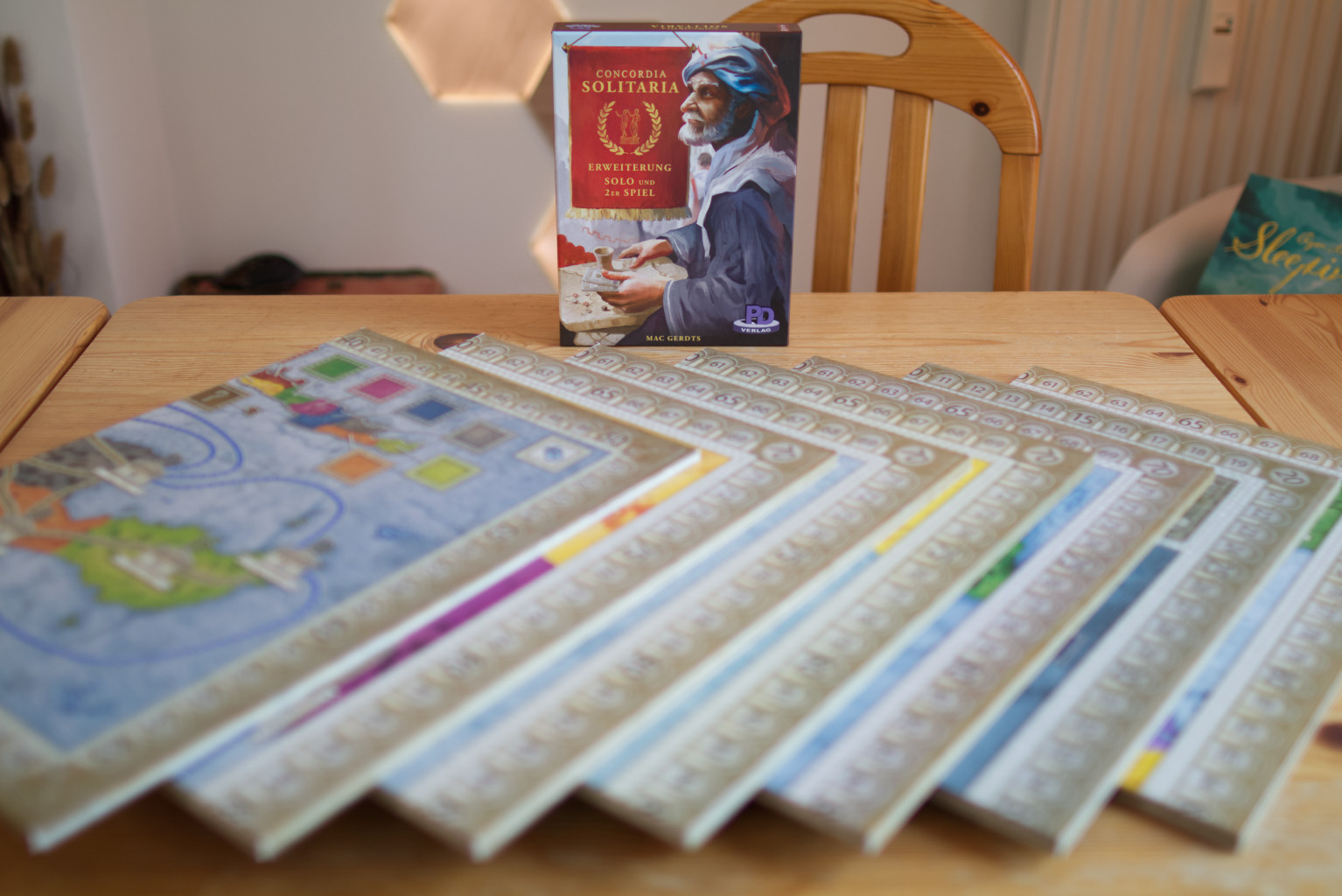
Dice Conquest. 30 min solo dungeon crawl
Just dropping a comment here: I really, really enjoy your reviews and the conscientious work you put in them. I am only just now trying to get in the board game hobby – not sure yet if it is my cup of tea – and having watched hundreds of video’s, read dozens and dozens of written reviews and been exploring the BGG forum daily – I am fanatic like that 🙂 – yours truly seem one of the most informative and soundly critical & reasonable essays I’ve come across. It seems we have similar tastes and standards, so I will check back here (or on BGG) once I’ve tried some board games you recommend. Cheers!
PS What I especially appreciate about this post is that you include the games that didn’t work for you. That makes your recommendations so much more useful.
Thank you so much, that just made my day!